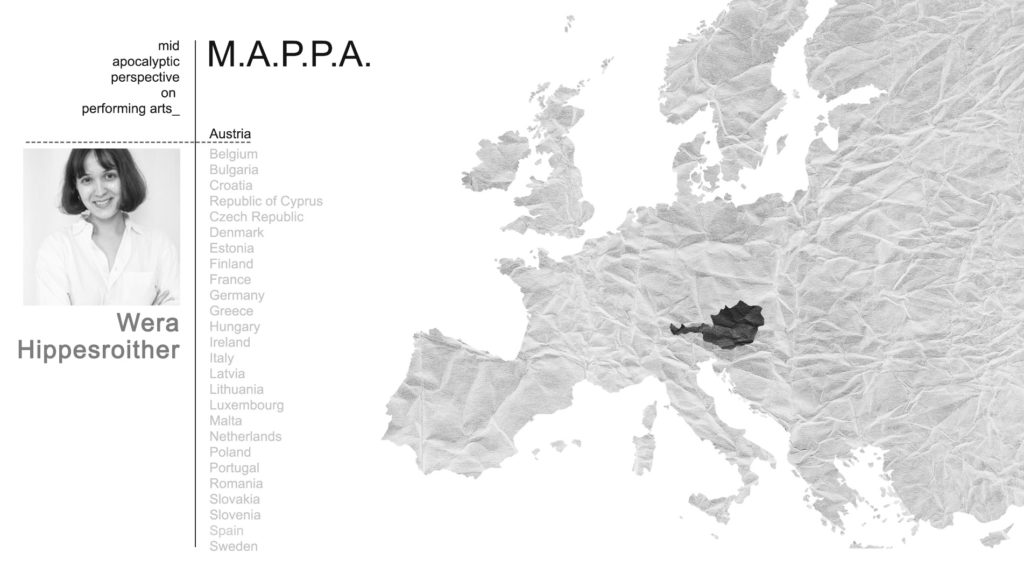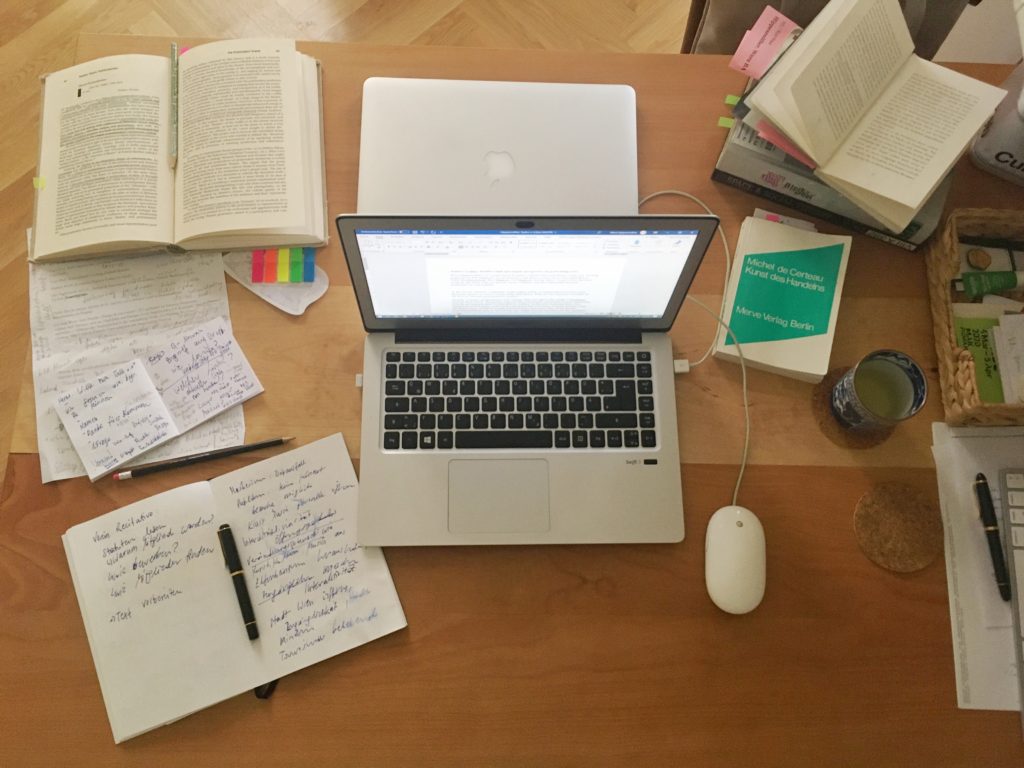
M.A.P.P.A. è un progetto di ricognizione e mappatura internazionale sulla critica dedicata alle performing arts. Abbiamo intervistato giovani giornalisti, osservatori e critici provenienti da tutta Europa.
Leggi le altre interviste di M.A.P.P.A.
Wera Hippesroither è una giornalista culturale indipendente e ricercatrice teatrale di base a Vienna. Scrive principalmente per PW Magazine (webzine culturale in tedesco e inglese), ma le sue recensioni di teatro e danza sono state pubblicate anche su Falter Wochenzeitung, Brut Magazin, Gift Magazin, tra gli altri. Nell’ambito della sua ricerca di dottorato, si occupa di forme di teatro site specific e del rapporto tra performatività e mobilità.
Quali misure sono state prese a sostegno dei lavoratori dello spettacolo in Austria?
Tutti i teatri hanno cominciato a chiudere, di loro iniziativa, intorno al 12 marzo. Era proprio nel mezzo dell’Imagetanz festival (organizzato da brut, centro viennese di produzione indipendente fra i più rilevanti dell’area mitteleuropea, ndr). Le restrizioni di viaggio imposte rapidamente e le istruzioni inizialmente ambigue da parte del governo hanno reso impossibile continuare. All’inizio c’erano regole su quanti metri quadrati per persona dovessero essere resi disponibili e quanto grandi le sale del teatro per mantenersi a distanza l’una dall’altra. Alcuni teatri hanno considerato di limitare la capacità e di lasciare posti vuoti tra gli spettatori, ma i regolamenti sono stati rapidamente rivisti, sono diventati sempre più rigidi e presto sono state imposte restrizioni all’uscita a livello nazionale. Niente più confusione quindi: uno dopo l’altro i grandi festival sono stati cancellati. Wiener Festwochen e Impulstanz hanno coltivato per un po’ la speranza di andare in scena, poi sono saltati. A partire da luglio, esiste un programma di “finanziamento ponte” per cui gli artisti indipendenti possono ricevere 1000 € al mese per un periodo di sei mesi. Esiste inoltre un generico “fondo per le difficoltà” che di nuovo prevede una sovvenzione di 1000 € al mese. Tuttavia, non è ancora chiaro chi abbia il diritto di farne richiesta e se un artista debba essere registrato come autonomo, per esempio. Per le aziende come i teatri ci sono sussidi a fondo perduto e proroghe per i pagamenti.
Quali sono le misure previste riguardo alle riaperture dei teatri?
Dal 1° luglio, gli eventi con posti assegnati e contrassegnati sono consentiti in spazi chiusi con un massimo di 250 persone in platea. È necessario mantenere una distanza minima di un metro e indossare maschere protettive quando si entra nel teatro. Le prove sono state possibili con restrizioni sin dalla fine di maggio. Se non è possibile mantenere la distanza minima obbligatoria, si consiglia la formazione di gruppi fissi, pareti divisorie o pannelli in plexiglass. Tuttavia, la maggior parte dei registi teatrali ritiene impossibile provare adeguatamente con queste restrizioni, così molti teatri non riapriranno fino all’autunno e la stagione estiva è generalmente considerata conclusa.
Il periodo del lockdown ha visto molti teatri e compagnie pubblicare su internet parte dei loro archivi. Molte sono anche le performance nate online, così come si parla sempre più di residenze digitali. Persino i festival, luoghi di incontro per eccellenza, stanno proponendo un cartellone digitale. Come vi relazionate a queste modalità di fruizione?
Apprezzo la grande offerta che ora è disponibile, ma sono molto critica. Secondo me, lo streaming non è un’alternativa adeguata. Proprio in quanto formato digitale, non può catturare la natura vivida del teatro. L’aspetto live è troppo importante e semplicemente non può essere digitalizzato. In una performance, è importante sperimentare la produzione come atto collettivo, come esperienza condivisa. L’enorme quantità di offerte su Internet rende il teatro in qualche modo un prodotto da consumarsi rapidamente fra una sessione Netflix, magari andando avanti veloce quando diventa noioso. Non mi piace affatto questo aspetto. C‘è anche una questione politica di visibilità. Chi può permettersi di fare streaming? Chi ha gli strumenti tecnici per registrarsi mentre si esibisce? Chi fornisce l’infrastruttura? Gli interpreti e le ballerine freelance spesso perdono terreno, solo i principali teatri e istituzioni possono davvero trarne beneficio.
Quali sono state le pratiche performative più interessanti durante i giorni del lockdown dal tuo punto di vista?
Vorrei citare come buon esempio il progetto Performance Homework di Michikazu Matsune. Il progetto non mostra una performance digitale, ma piuttosto fornisce istruzioni, i cosiddetti compiti a casa, per esibirsi fra le proprie quattro mura: tutti possono provare l’esecuzione della performance. L’esperienza viene così riportata al pubblico, al suo corpo e ai suoi sentimenti. E poi c’è brut Wien, che ha cambiato spontaneamente il suo slogan “New Art on Stage” in “New Art On … line” e presenta video divertenti con approfondimenti sulla vita personale e sul lavoro degli artisti. Ma apprezzo anche il modo in cui Tanzquartier rimane quasi in silenzio. La sua direttrice Bettina Kogler ha preso una posizione chiara e si è espressa contro un’offerta digitalizzata, che ritengo sia una risposta molto appropriata alla crisi.
Credi che questa crisi cambierà profondamente i linguaggi, gli spazi, i temi delle arti performative?
Penso che i linguaggi performativi, e in particolare la danza, debbano porre domande che incidano sulla natura stessa del loro genere. In queste forme d’arte lo scambio con il pubblico, la vicinanza e l’interazione sono fondamentali. Il modo in cui noi come società pensiamo alla vicinanza e alla distanza sta già subendo un cambiamento. I valori sociali devono essere ripensati, e poiché il teatro risponde sempre alla realtà e alle funzioni come mezzo di riflessione, molto sarà collegato alla crisi, soprattutto in termini di argomenti. Per quanto riguarda i luoghi del teatro, molto probabilmente cambierà come in tutti gli altri spazi pubblici (distanza, maschere, disinfezione).
È possibile vivere del mestiere del critico in Austria?
La critica in Austria rientra chiaramente nella categoria del lavoro giornalistico. Trova anche una sovrapposizione con il lavoro accademico: spesso sono i docenti a scrivere recensioni. Io stessa sono una ricercatrice teatrale e attualmente sto lavorando alla mia tesi di dottorato. Soprattutto a Vienna, c’è un pubblico attivo e un forte interesse per la critica. In generale, i giornalisti hanno spesso difficoltà a guadagnarsi da vivere dal loro lavoro e spesso sono liberi professionisti, ma a parte il lato finanziario, ora è particolarmente difficile per autori che come me scrivono di teatro: il nostro argomento è improvvisamente svanito. Scrivere recensioni sui live streaming mi sembra strano e inappropriato. Dopotutto, non sono una teorica dei media.
Che cosa ti manca di più della dimensione live delle arti performative?
A parte la voce dei grandi artisti e i festival estivi, ciò che mi manca di più è la funzione del teatro come forum di incontro e scambio. Mi manca il contatto diretto coi performer e col pubblico. Mi manca anche molto scrivere di teatro. Scrivere per me è una forma essenziale di espressione e processo di pensiero, già sento un gran “prurito” alle dita.

Wera Hippesroither is a Vienna-based freelance cultural editor and theatre researcher. Writing primarily for PW Magazine, her performance and dance reviews have been published in Falter Wochenzeitung, Brut Magazin, Gift Magazin, among others. As part of her doctoral research, she deals with site-specific forms of theatre and the relationship between performativity and mobility.
What are the measures overtaken by the Autrian government, or by the local institutions, in support of the theatre workers?
Around March the 12th, all playhouses were closing. That was right in the middle of Imagetanz Festival (brut Wien). The quickly imposed travel restrictions and initially bizarre instructions from the government made it impossible to continue. In the early beginning there were regulations on how many square meters per person had to be made available and how large the theatre rooms should be in order to keep distance from each other. Some theatres considered limiting capacity and leaving seats empty between spectators, but the regulations were quickly revised and became stricter and stricter, and soon nationwide exit restrictions were imposed. No more confusion then: one after another the big festivals were cancelled. Wiener Festwochen and Impulstanz still had a faint hope for a while, but were then cancelled quickly. Starting in July, there is a “bridging financing” program where self-employed artists can receive €1000 over a period of six months. Furthermore, there is a “hardship fund”, which is also €1000 per month. However, it is still quite unclear who is entitled to claim and whether one has to be registered as a self-employed artist, for example. For companies there are fixed cost subsidies and extensions for payments.
What are the measures concerning the reopening of theatres?
Since from July the 1st, events with assigned and marked seating are permitted indoors with up to 250 people among the audience. A minimum distance of one meter must be maintained and protective masks must be worn when entering the playhouse. Rehearsals have been possible with restrictions since the end of May. If the mandatory minimum distance cannot be maintained, the formation of fixed teams, separating walls or plexiglass panels is recommended. However, most theatre directors consider it impossible to rehearse properly under these restrictions. Many theatres are not expected to open again until autumn, and the summer season is generally considered to be over.
During the lockdown many theatres and companies published part of their archives on the Internet. Also, we have been watching many digital performances, as well as there has been an intensive talking about “digital residences”. Even the festivals, that can be seen as the most evident meeting places, are proposing a digital billboard. How do you relate to this way of enjoying the performing arts?
I appreciate the great offer that is now available but I am very critical. In my opinion, streams cannot be an adequate alternative. As a digital format, they can’t capture the vivid nature of theatre. The live aspect is just too important and simply cannot be digitized. Especially with performance, it is very important to experience the production as a collective, as a group with shared experience. The huge amount of offers on the internet makes theatre somehow a commodity that can be consumed quickly between a Netflix session and fast-forwarded when it gets boring. I do not like this aspect at all. It is also a political question of visibility. Who can afford to do streams? Who has the technical tools to record themselves while performing? Who provides the infrastructure? Freelance performers and dancers often lose out and only major playhouses and institutions can really benefit.
The most interesting alternative theatrical practices you have experienced in these days
What I would like to mention as a well-done example is Michikazu Matsune‘s project Performance Homework. The project does not display digitized performance, but rather provides instructions, so-called homework, for performances in one’s own four walls. The execution of the performances is transferred to the spectators and can be done by everyone. The experience is thus brought back to the audience, to the body and its feelings. Brut Wien has changed its slogan “New Art on Stage” spontaneously into “New Art On… line” and presents quite amusing videos with insights into the life and work of performers. I highly appreciate the way Tanzquartier remains almost silent. Its director Bettina Kogler has taken a clear stance and spoke out against a digitalized offering, which I think is a very appropriate response to the crisis.
Do you think the current state-of-things will affect the language, the topics, the space of the performances etc…in deep?
I think that performance, and dance in particular, need to pose questions that affect the very nature of their genre. In these art forms exchange with the audience, proximity and interaction are vital. How we as a society think about closeness and distance is already undergoing a change. Social values need to be thought about anew, and since theatre always responds to reality and functions as a means of reflection, much will be related to the crisis, especially in terms of topics. Regarding theatre venues, as much will probably change as in all those other public spaces (distance, masks, disinfection).
What is the labor framework of the performance art criticism in Austria?
Performance critique in Austria clearly falls under the category of journalistic work. I also find that there is an overlap with academic work, it is often experts who write reviews. I myself am a theatre researcher and currently working on my dissertation dealing with performance. Especially in Vienna, there is an active readership and a strong interest in criticism. In general, journalists often have difficulties making a living from their work and are frequently freelancers, but apart from the financial side, it is especially tough now for writers like me who write about theatre: our subject has abruptly vanished. Writing reviews about live streams seems strange and inappropriate to me. After all, I am not a media theorist.
What do you miss most from live performances and plays?
Apart from the many great performers and summer festivals, what I miss most is the function of theatre as a forum for encounters and exchange. I miss the direct contact with performers and audience as much as the live experience. I also deeply miss writing about theatre. To write is an essential form of expression and thought process to me and I can feel my fingers “itching” already.











